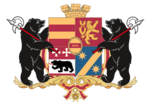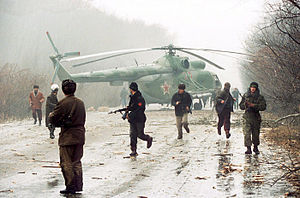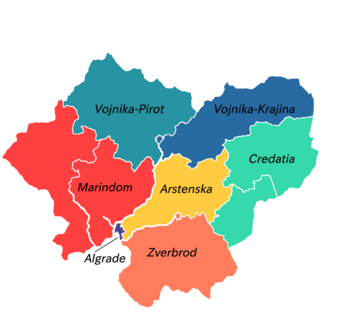Krovech
This article is incomplete because it is pending further input from participants, or it is a work-in-progress by one author. Please comment on this article's talk page to share your input, comments and questions. Note: To contribute to this article, you may need to seek help from the author(s) of this page. |
Republic of Krovech Republika Krovska (Krov) | |
|---|---|
| Motto: “Težimo za jedinstvo.” "Strive for unity." | |
| Anthem: "Hymn of the Young Republic." | |
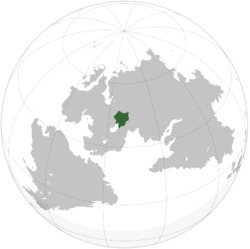 Krovech (dark green) located in Asura | |
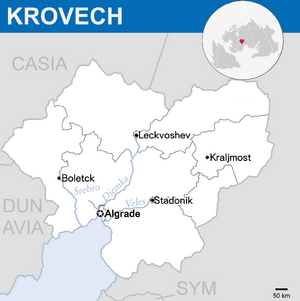 Location of Krovech and it's districts | |
| Capital and largest city | Algrade |
| Official languages | Krov |
| Ethnic groups | 81.3% Krov
12.9% Leckvic, 6.7% Other |
| Demonym(s) | Krov, Krovak |
| Government | Unitary parliamentary constitutional republic |
• President | Ivan Ambrozije |
• Prime Minister | Roman Stojan |
| Legislature | Parliament |
| Establishment | |
• Unification | 14th century |
• Treaty of Algrade | 1446 |
• Republic proclaimed | August 14th, 1888 |
• Current constitution | November 18th, 2002 |
| Population | |
• Estimate | 21,550,800 |
| GDP (nominal) | estimate |
• Total | $160 billion |
• Per capita | $24,530 |
| Gini | 33.5 medium |
| HDI | 0.88 very high |
| Currency | Krov dinar (RKD) |
| Time zone | UTC +2.5 |
| Date format | dd ˘ mm ˘ yyyy |
| Driving side | right |
| Calling code | +46 |
| ISO 3166 code | KR |
| Internet TLD | .kr |
Krovech Krov: Кrovska [krəʊvskɑ]), officially the Republic of Krovech (Krov): Republika Krovska [rɪˈpʌblɪka krəʊvskɑ]) is a sovereign state situated in east Asura. It is bordered by TBD. As of 2020 it is inhabited by nearly 21 million citizens. The most spoken and official language of Krovech is Krov with over 20 million speakers. Krovech is a unitary parliamentary constitutional republic. The countries climate stays temperate with it's notable geography of coastal beaches wrapped around it's southwest and flat and agrarian lands with low mountains in it's northwest. The capital and largest city of Krovech is Algrade out of the divided 11 districts of the nation with the cities of Boletck, Algrade, and Leckvoshev with autonomous city authority.
Before the creation of the Krov republic were petty kingdoms neighboring the smaller territories of modern day cultural regions of Arstenska and Vojnika dated in the 14th century, the Krovs, consolidating for a great feudal kingdom formed a short lived dual monarchy with the Arstensks and forged a maritime kingdom of commerce. In many instances the throne was contested many times notably the Kamenar War lasting from the late 14th century and into 1421 between the Arstensk House of Inovo and the Krov House of Bortis which ended in a Bortis victory. The Arstensk dynasty shortly became heirless after the death of King Mioslav IV and dissolved quickly after. Later into the 15th century Leckvoshev was in constant skirmishes between Leckvic Vojnik-Krajina and the Krov House of Dražen under Marin the Great until the 1446 Algrade Accord, capitulating Leckvoshev and ending the war.
The kingdom underwent the ages of enlightenment where reforms opted to centralize the government, rename the monarch holder King of the Krovaks, abolish serfdom and establish a parliament in Algrade. Incompetence of the concurrent ruler Selkovic II in the 19th century would see many natural disasters and famines crippling the economic stability. The failure of the monarchist government created a bloody 2 year civil war which would result in the abolishment of the monarch and the creation of a parliamentary republic.
The proclamation of the Republic of Krovech would see a convention to create a constitution and its elections between it's newly birthed parties. After the infighting internal issues regarding Leckvoshev given independence in return for its contributions to the monarchist government during the civil war, it had created a thought of revanchism from the late 20th to the early 21st century where the country oversaw the ethnic nationalism in the streets of Leckvoshev erupt into violence due to the failed expectations of a reformed democratic government after corruption was seen within former President Franko Krešimir's administration. Months into the culminating insurrection in the hastily established separatist government in the Krajina; tensions defused in peace agreements with Leckvoshev granted city autonomy and status was increased in the Boletck Agreement in 2002.
Krovech has since regained its economic growth with its developed high income service and market based economy, the country is notable for it's historical and financial architecture in it's city centers and marginal though thriving agrarian foods and culture.
Etymology
The origins of the name Krovech comes from the Proto-Leonic word krȍv (roof) and "-ech", meaning land. Usages of the word among many later variations can be traced by the first settlements of Marindom in the early 600's by the intruding Krovs. After the many centuries of conquering the west of the Diemka the now loose kingdom had the name applied to the expanded elevated territories stopping to the raided Vojnika frontier, making it the 'roof' of Krovech.
History
Antiquity
- Migration of Arstensk and Leckvic peoples
- Arstensk peoples move to favorable coastal sites
- Algrade is shortly founded
- Ends with the latter Krovs moving into regional Marindom in the early 600's
Middle Ages
- First settlements of Krovs settling west of the Srebro within Marindom
- Boletck is founded by Bortis Dynasty, reaching east of the Srebro
- Dual monarchy is formed between neighboring Kingdom of Arstenska
- Dual monarchy is short lived, opposition against foreign kings start Kamenar War
- Kamenar War ends in the Seige of Algrade, Arstensk House of Inovo shortly comes out with no heir
- Algrade is incorporated within the Kingdom of Krovech, utilized for maritime trade and fishing
- House of Inovo dissolves, House of Drǎzen forms upon electing Krov nobles
- Skirmishes between Leckvic confederal tribes and Krovech erupt, huge loss of life in the rural areas
- Marin II, or Marin the Great wages war with the tribes, winning and further unifying Krovech, though under passive terms
Early Modern Period
- Krovech goes through enlightenment and renaissance era
- Modernization occurs
- Brief uprising in Algrade
Nineteenth Century
- Economic downturn begins
- Wide disfavor of the monarchy starts
- Liberal enlightenment ideas spreads
- Natural disasters and famines begin, poor handling causes nation wide rioting
- Statesmen, philosophers, and military leaders and cadets begin favoring democratic government
- Civil war erupts, lasting 2 years, monarchy collapses as royalists capitulate
- Democratisation and reform begins under new government
- Industrialization begins
Krovo-Leckvic Conflict
- TBD
- TBD
- TBD
- TBD
- TBD
2002 Reform
Geography
Krovech is a landlocked state with a varied range of geography. Krovech's rivers and water sources, the Srebro, Diemka, and Veles, all run through it's vital population centers. The elevation ranges from the steep and coastal lake where the basin city Algrade is settled to the rolling hills, river valleys and sometimes mountainous territories of Vojnika-Pirot to Vojnika-Krajina. Northern Krovech's forested mountainous areas also hold places of run of the river hydroelectricity sights. Vojnika-Krajina also possesses the highest elevated point in Krovech, Borti Gora. The natural resources of Krovech major in deposits of salt, iron, copper, all of these being mined frequently in the north.
Majority of Krovech's population resides in the southern cultural regions of Zverbrod, Marindom and Algrade, all in the temperate forests and flatland utilized for agriculture. Within central Krovech, Arstenska, possesses many fields of rural landscapes notable for its wine produce. The further east of Krovech, Credatia, is comprised of partial subartic forests where not much of the population resides. Despite the majority population in southern Krovech, the north keeps a sizable populous focused in the city of Leckvoshev.
Climate
The Krov climate mainly keeps itself at a temperate continental climate. Its seasons maintain warm summers and cold winters. Snowfall occurs mainly within the mountainous Vojnika regions in the north. Temperatures see a stark contrast depending on elevation, decreasing normally when the elevation increases. Krovech's coldest month is February falling behind December, while the hottest are July later into August. The Autumn seasons remain warm and also begin within September, though they begin to drop in temperature in October. The warmest areas have been recorded at Algrade while the coldests were within Vojnika-Pirot. Summers also receives the most rain out of any other season, with winters taking the least. Krovech also receives more precipitation the further south and west in the mixed forests of Credatia.
Politics
Government
Krovech is a multi-party parliamentary constitutional republic with a president acting as Head of State and Prime Minister as Head of Government. The president serves with limited powers though they take chief command of the military and appoint members of the National Bank. The foundation of the democratic government began after it's 2 year civil concluding in 1872. Today's constitution was passed in the 2002 reform after the formal end in the 1998 Krovo-Leckvic conflict, further changing the amendments in referendum before the change in presidential administrations prior. The Prime Minister serves with a wider range of powers such as appointing and coordinating activities of government ministers, the current Head of Government is Roman Stojan. However Head of State is elected through a popular vote and serves 2 terms for 5 years, the acting Head of State is Ivan Ambrozije. In addition to the Head of Government they serve a term length pending on the satisfaction of the parliament majority. Krovech's government meets in Algrade, Krovech's capital.
The Krov Parliament is a unicameral legislature of Krovech responsible for the creation of laws and representing its political parties. Members of Parliament are elected through first past the post among the constituencies similar to the districts and all individually serve a 5 year term. The party politics can be defined by the coalitions of predominantly - TBD
Law and Order
Administrative Divisions
Since the 2002 reform, Krovech has been divided into 8 districts and 3 cities. Each region maintains a regional parliament and standing governor. Before the 2002 reform the city of Leckvoshev was included within the Vojnika District, though after the change the city detached from Vojnika, as well as gaining more autonomy status.
| Region | Capital | Population | Year established |
|---|---|---|---|
| Algrade | — | 6,442,025 | 1872 |
| Leckvoshev | — | 2,000,823 | 2002 |
| North Credatia District | Kraljmost | TBD | TBD |
| Novi Bol District | Boletck | TBD | TBD |
| Pirot District | Crnbrod | TBD | TBD |
| South Credatia District | Smeđíva | TBD | TBD |
| Stadonik | — | TBD | TBD |
| Vinonik District | Novi Međa | TBD | TBD |
| Vojnika District | TBD | TBD | TBD |
| Zemjla District | TBD | TBD | TBD |
| Zverbrod District | Beovetka | TBD | TBD |
Military
The Krov Armed Forces consists of the Army, Air forces, and Navy. The Armed Forces are under the Ministry of Defense with the Head of State taking position as commander in chief. Military spending makes up 2.1% of the of the GDP. Krovech's military stands at 56,000 active duty personnel, while the majority of forces are reserved personnel. Around 30% of the active duty personnel are made up uniformed professional soldiers. Many of the conscripts are trained in the conditions for warfare in the frontier. Krovech is one of the few countries in Aeia that implements universal conscription for males aged above 18 to serve 6-14 months of armed service. Women are permitted to serve voluntary combat roles such as infantry and special forces. The Krov Land Forces follow a doctrine of peace through strength, with many garrisons stationed north of Krovech.

